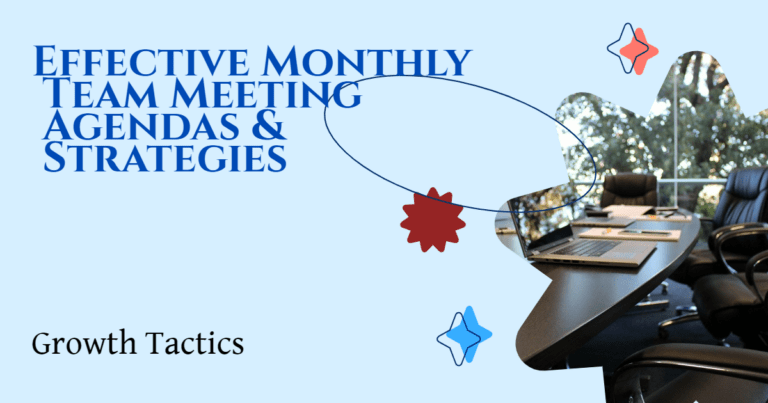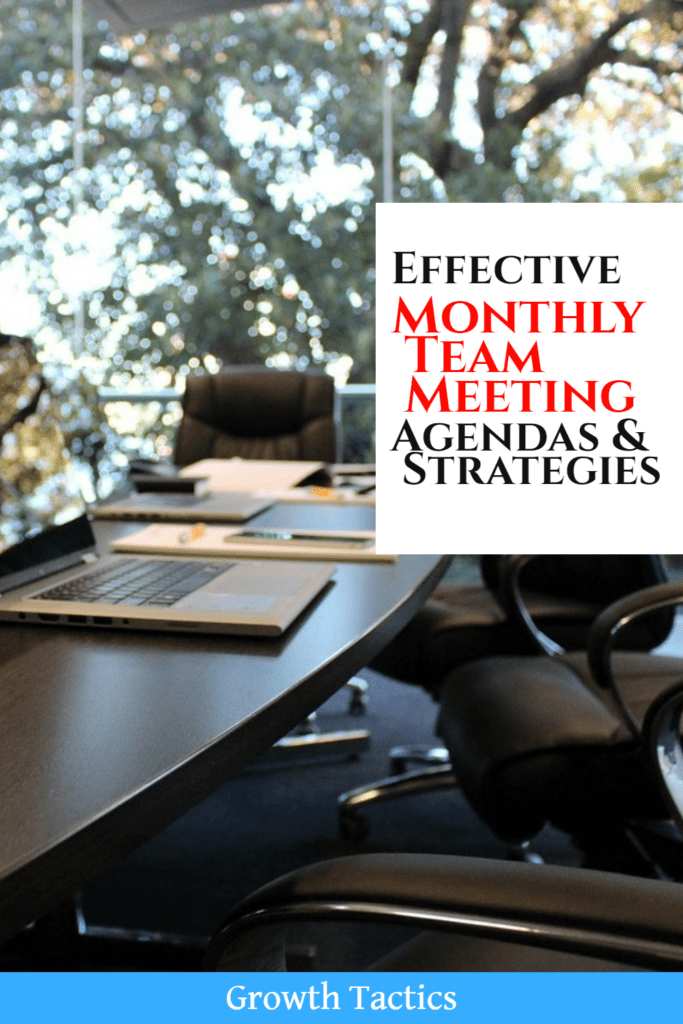Effective monthly team meetings play a vital role in boosting productivity and collaboration within organizations. This article highlights the significance of well-planned agendas and strategies for these meetings. We will explore actionable recommendations to optimize team meetings and enhance overall productivity. Let’s dive in and uncover the secrets to successful monthly team meetings.
Jump To Section
Importance of Effective Monthly Team Meeting Agendas and Strategies
-
Enhancing Focus and Direction: A well-planned agenda provides clarity and direction for team meetings. It helps set priorities, ensuring that the discussion stays focused on important topics and goals. By establishing clear objectives and agenda items, team members can better prepare and contribute meaningfully to the meeting.
-
Maximizing Time Efficiency: Effective agendas assist in time management during team meetings. By allocating specific time slots for each agenda item, team members can stay on track and avoid lengthy discussions that derail the main purpose of the meeting. This ensures that meetings are efficient, and productive, and respects everyone’s time.
-
Promoting Collaboration and Communication: Team meetings are valuable opportunities for open communication and collaboration. By including interactive agenda items, such as brainstorming sessions or group discussions, team members can actively participate, share ideas, and provide valuable insights. This promotes a collaborative atmosphere, encourages teamwork, and fosters synergy among team members.
-
Ensuring Accountability and Action-oriented Discussions: Effective team meetings are not just about discussion but also about actions and outcomes. By including specific action items and next steps in the agenda, team members can take ownership of tasks and commit to follow-up actions. This helps in keeping everyone accountable and ensures that progress is made towards achieving team goals.
-
Building Team Engagement and Motivation: Well-planned agendas and strategies make team meetings more engaging and motivating. By incorporating elements like recognition for achievements, sharing successes, or assigning challenging tasks, team members feel valued and motivated to participate actively. This creates a positive and energizing environment, boosting team morale and overall performance.
In the following sections, we will explore practical tips and strategies for creating effective monthly team meeting agendas and implementing successful meeting strategies to maximize productivity and collaboration within your team.
Actionable Recommendations for Effective Monthly Team Meetings
-
Set Clear Objectives: Before planning a team meeting, define clear objectives that align with the team’s goals. Identify what you want to achieve and outline specific outcomes that should result from the meeting. This will help in creating a focused agenda and ensure that the meeting stays on track.
-
Create a Detailed Agenda: Develop a detailed agenda that includes specific discussion topics, time allocations for each item, and any necessary materials or resources. Share the agenda with team members well in advance so they can come prepared and contribute effectively during the meeting.
-
Prioritize Agenda Items: Arrange agenda items in order of priority, placing the most important topics towards the beginning of the meeting. This ensures that crucial matters are addressed when the team is most focused and energized. Less critical items can be scheduled towards the end or moved to future meetings if necessary.
-
Encourage Active Participation: Foster a culture of active participation by creating an inclusive environment where everyone feels comfortable expressing their ideas, opinions, and concerns. Encourage team members to actively contribute, ask questions, and provide insights during discussions.
-
Time Management: Respect everyone’s time by strictly adhering to the allocated time for each agenda item. Designate someone to keep track of time and tactfully move the discussion forward if it becomes unproductive or off-topic. This will help optimize meeting efficiency and ensure that all agenda items are addressed.
-
Record Meeting Minutes: Assign someone to take meeting minutes and capture key discussion points, decisions, and assigned action items. Circulate the minutes to all team members after the meeting as a reference and reminder of the agreed-upon outcomes.
-
Review and Follow-Up: After the meeting, review the action items identified and ensure that tasks are assigned to the appropriate team members. Set deadlines and establish a system for tracking progress and follow-up on actions. Regularly revisit and discuss progress made in subsequent team meetings.
By implementing these actionable recommendations, you can enhance the effectiveness of your monthly team meetings, promote collaboration, and drive measurable outcomes.
Common Challenges and Solutions in Monthly Team Meetings
Despite the best intentions and efforts, team meetings can sometimes encounter challenges that hinder productivity and effectiveness. Understanding and addressing these challenges can help overcome them and create more successful meetings. Here are some common challenges and their corresponding solutions:
-
Lack of Preparation: One challenge is when team members come to the meeting unprepared or without sufficient knowledge about the agenda items. To overcome this, clearly communicate the meeting agenda and provide necessary materials in advance, allowing team members ample time to prepare and contribute meaningfully to discussions.
-
Unproductive Discussions: Lengthy, unproductive discussions can derail meetings and waste valuable time. To address this challenge, establish clear ground rules for discussions, set time limits for each agenda item, and assign a facilitator who can guide the conversation and keep it focused on the key points. Encourage active participation and provide opportunities for everyone to share their thoughts without dominating the discussion.
-
Lack of Engagement: When team members are disengaged or passive during meetings, it can hinder collaboration and decision-making. To foster engagement, create interactive elements in the agenda, such as group activities, problem-solving exercises, or opportunities for individuals to present their work or ideas. Encourage participation, ask for input from all team members, and recognize and appreciate contributions to boost engagement.
-
Poor Time Management: Meetings that go over time or don’t allocate sufficient time to each agenda item can be inefficient and frustrating. To address this challenge, set clear time limits for each agenda item and stick to them. If a topic requires more time for thorough discussion, consider scheduling a separate meeting dedicated to that specific issue. Use time-tracking tools or appoint someone to monitor and manage the meeting’s pace.
-
Lack of Follow-Up: Failure to follow up on action items and decisions made during meetings can lead to inaction and lack of progress. To ensure follow-up, assign action items with clear responsibilities and deadlines during the meeting. Regularly review progress in subsequent meetings and provide updates on completed tasks. Utilize project management or task-tracking tools to monitor and track progress outside of meetings.
By identifying and addressing these common challenges, you can improve the effectiveness of your monthly team meetings, promote collaboration, and drive positive outcomes for your team and organization.
Continuous Improvement and Evaluation of Monthly Team Meetings
To ensure that your monthly team meetings remain effective and productive, it is crucial to continuously evaluate and improve them. Here are some strategies for continuous improvement:
-
Collect Feedback: After each team meeting, collect feedback from participants to gain insights into what worked well and areas that need improvement. Use anonymous surveys, individual conversations, or a designated feedback platform to encourage honest feedback. Analyze the feedback and identify patterns or common themes to guide your improvement efforts.
-
Reflect on Meeting Dynamics: Reflect on how the team interacts during the meetings. Are there any communication or collaboration challenges that need to be addressed? Consider assessing team dynamics, such as participation levels, decision-making processes, and inclusivity. Look for ways to foster a more collaborative and supportive environment.
-
Explore Meeting Formats: Consider experimenting with different meeting formats to keep them engaging and dynamic. For example, you could incorporate guest speakers, workshops, or even virtual team-building activities. Rotate the role of the meeting facilitator to provide fresh perspectives and approaches.
-
Review Agenda Effectiveness: Regularly review the meeting agenda to ensure it adequately addresses the team’s needs and goals. Evaluate the relevance of agenda items and their impact on achieving desired outcomes. Seek input from team members on agenda topics and consider rotating the responsibility of agenda creation within the team.
-
Implement Technology Solutions: Explore technology tools and platforms to streamline meeting processes and enhance collaboration. Virtual meeting tools, shared task management systems, and collaborative document editing platforms can improve efficiency and make it easier to track progress and actions.
-
Learn From Best Practices: Stay informed about best practices in conducting effective team meetings. Attend webinars, read articles or books, and seek insights from industry professionals. Adopt and adapt techniques that align with your team’s needs and culture.
-
Communicate Meeting Outcomes: Share meeting outcomes and progress with the wider team or stakeholders who were not present at the meeting. This promotes transparency, alignment, and accountability throughout the organization.
By actively seeking feedback, reflecting on meeting dynamics, exploring different formats, reviewing agendas, leveraging technology, learning from best practices, and communicating outcomes, you can continuously improve the effectiveness of your monthly team meetings and drive positive results for your team and organization.
Conclusion
Effective monthly team meetings are crucial for promoting collaboration, achieving goals, and driving progress. By implementing recommendations like setting clear objectives, creating detailed agendas, encouraging active participation, and practicing effective time management, you can enhance the productivity of your meetings.
Addressing common challenges such as lack of preparation, unproductive discussions, and poor time management is important. Continuously evaluating and improving meetings by collecting feedback, exploring different formats, and using technology solutions fosters a culture of improvement.
By communicating meeting outcomes and progress with the wider team, you ensure transparency and alignment throughout the organization. Taking a proactive approach to optimize your monthly team meetings creates a more collaborative and productive environment, leading to increased engagement and successful outcomes.


